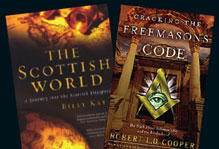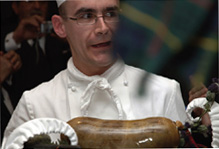An Appeal for Information
by David Stevenson
For someone who is not a Freemason to seek information from masons relating to their experiences in the craft will doubtless raise suspicions, so I better present my credentials. I am an academic historian who by great good fortunes stumbled on the riches of early Scottish Masonic archives about thirty years ago. Two books followed in 1988, The Origins of Freemasonry and Scotland’s First Freemasons (the former still available from Cambridge University Press, the latter recently reprinted by the Grand Lodge of Scotland). On seeking access to records in order to write my books, I received a welcome from all the Lodges concerned (with a single exception) after explaining I was not seeking to expose ‘secrets’ and was only interested in masonry several centuries ago.
In recent years I have extended my scope forward in time, in the hope of providing ideas and frameworks to encourage others (far more expert in modern history than I am) to undertake research in the field. Recently I talked ‘Four Hundred Years of Scottish Freemasonry’ at the opening of the splendid new building of the Centre for Research into Freemasonry at the University of Sheffield. One theme that I had to leave out of that talk (for lack of time) was working class involvement in Freemasonry, but I’m hoping to give on this theme to the International Conference on the History of Freemasonry being organised at Freemasons’ Hall in Edinburgh in May 2007. Working class Freemasonry is a theme that has a particular importance in Scotland. Only in Scotland can modern Freemasonry masonry trace it’s tap-root, its primary inspiration, to organisations of working stonemasons. And I think it is very probably true to say that the percentage of Freemasons in Scotland today who see themselves as ‘working class’ in origin is higher in Scotland than anywhere else.
Beyond such broad generalisations however, it is not easy to go, because of huge gaps in the evidence available. Masons, on the level, are not interested in the social class of initiates or the social make-up of Lodges. And most masons have perceptions of the extent of the secrecy that their craft requires of them that makes them avoid talking to non-masons about any aspects of their involvement.
This leaves me with an evidence-gap. Through being invited to talk to a fair considerable number of Lodges over the years, I know that some are mainly ‘working class’ in membership. I know that some Lodges exist made up almost entirely of ‘time served tradesmen,’ skilled workers with formal qualifications, the heirs of the masons who had served apprenticeships in past centuries. But I know of no recollections of individual experiences by such men. Social historians have interviewed many working men. But none have sought information on Masonic links – and of all the workers interviewed, none have volunteered the fact that they were masons.
Masons are sometimes indignant that social and cultural historians ignore them. But in part, IT’S YOUR OWN FAULT! Your silence makes you, evidentially, a black hole. If you want decent Masonic history to be written, record and talk about those aspects of your masonry which are not secret. You’re proud to be of the craft, so why lurk in silence.
After this rallying-cry, an appeal. Masons, write down or recall your experiences of Freemasonry. How does it fit into your life, work and leisure? Have you been a member of a trade union, a church, a political activists? You cannot not talk of such things in your lodge, but there’s no reason to be secretive in the outside world. The silent leave no history. This is a general appeal. Perhaps through this web page I could encourage recollections from old masons (of all classes) about their lives, social, political, leisure and working. Not a matter of details of initiations and of offices held, but their masonry in wider contexts, what sort of brethren did they meet in their Lodges – perhaps like themselves, or from diverse backgrounds?. This would be manna from heaven for future historians, but I think it would also be healthy from the point of view of public perceptions of the craft. It would present masons not as silent, secrecy-obsessed, but ordinary folk who, yes, may seem to place an odd importance on their strange Masonic thing, but are no more to be avoided that someone you, say, belongs to some exclusive sect.
From a general appeal to a personal one, related to my forthcoming talk. If any mason would like to This email address is being protected from spambots. You need JavaScript enabled to view it. about being a working class mason, or mixing with working class brothers, or the social make up of their Lodges, this would be hugely valuable to me and much appreciated. And of course, any material sent to me would be regarded as confidential.
Worker masons of Scotland unite, you have nothing to lose but the obscurity your silence condemns you to! Claim your place in history.
If you have any information that you think This email address is being protected from spambots. You need JavaScript enabled to view it. would be interested in please e-mail him at: This email address is being protected from spambots. You need JavaScript enabled to view it.



